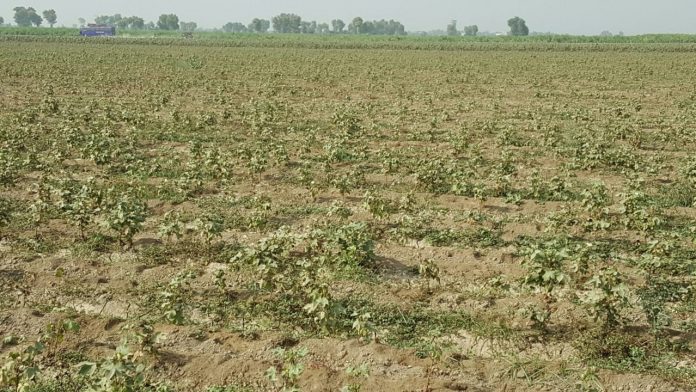LAHORE: The finance division is hopeful that the country’s agricultural sector will see positive returns from the rabi season off the back of favourable conditions created by the prime minister’s Kissan Package announced in the wake of last year’s devastating floods.
In its monthly report for the end of the last year, Q-block reported that for Rabi season 2022-23, the wheat crop has been sown on an area of 20.77 million acres. “The input situation is expected to remain favourable due to incentives announced in Kissan Package 2022 that will boost agriculture productivity,” reads the report.
The better input situation is expected to increase crop production in Rabi season. According to IRSA the irrigation water supply recorded at 6.32 MAF for November 2022 against last year’s supply of 5.50 MAF, increased by 0.82 MAF. During Jul-Nov FY2023, the agriculture credit disbursement increased by 35.9 percent to Rs 663.9 billion from Rs 488.5 billion compared to corresponding period last year. During Rabi 2022-23 (November 2022), urea and DAP off-take stood at 583 thousand tonnes (1.6 percent higher than November 2021) and 236 thousand tonnes (7.5 percent higher than November 2021).
Devastation
The last year had seen climate-change driven floods seriously impacting the country’s agriculture and threatening its food security. Already a net importer of food, Pakistan’s self-sufficiency struggles continue to climb a steeper and steeper hill.
The biggest news this year not just in agriculture but in the entire country and possibly the world this year were the floods in Pakistan. In short, climate change has resulted in a gargantuan increase in the amount of monsoon rainfall that Sindh and Balochistan have seen this year. The two provinces saw the highest amount of water fall from the skies in living memory, recording 522 and 469 per cent more than the normal downpour this year according to the met department.
The economic impact alone has been devastating. All in all, according to the latest report of the Post-Disaster Needs Assessment (PDNA), Pakistan needs at least $16.3 billion for post-flood rehabilitation and reconstruction. The PDNA report, released by the representatives of the government and the international development institutions, calculated the cost of floods at $30.1 billion – $14.9 billion in damages and $15.2 billion in losses.
Kissan package
The Kissan Package was announced only a few months ago by prime minister Shehbaz Sharif in the wake of the floods. Under this subsidy scheme, the government will give Rs10.6 billion loans to small farmers across the country while small farmers of flood-hit areas would get loans worth Rs 80 billion. In addition to the interest-free and subsidised loans, subsidies will also be given on farm imports such as fertilisers, electricity, seeds, and even tractors. If implemented correctly, the package will have a wide-reaching impact in helping farmers affected by this year’s floods back on their feet.
By the end of December 2022, the government announced that they had managed to disburse agricultural loans worth Rs 663.9 billion in the month of November to flood-hit farmers in dire need of recuperation. The amount of loans disbursed is expected to go up to Rs 800 billion by the end of December. Addressing a press conference on Wednesday, Minister for Food Security and Research Tariq Bashir Cheema said that the agriculture loan was the component of Prime Minister Kissan Package of Rs 1,819 billion to revive Pakistan’s agriculture sector, particularly restoring the agriculture of areas affected by catastrophic floods during monsoon season.
However, it is worth mentioning here that this is as far as it can and should go. The scale of the problem faced by our agricultural sector will not be fixed by any subsidy package. At most, any subsidy will provide temporary relief. For too long the state has allowed the country’s agriculture to suffer and have offered only stop-gap solutions such as subsidy packaged. We have been papering over the cracks for so long that our entire agrarian economy has grown dependent on subsidy packages.





Nice post ! These apartments’ sizes are 283 sq ft. The pre-launch price of these studio apartments is 48 lacs whereas the booking starts from 19.20 lacs. The remaining will be payable in 24 monthly installments (80,000/- each). The amount payable after 3 months of booking is 4.80 lacs. The possession amount of the apartments is 4.80 lacs.
I have regularly check your posts. Because your posts convey informative and accurate information. I hope you continue to write. Thanks